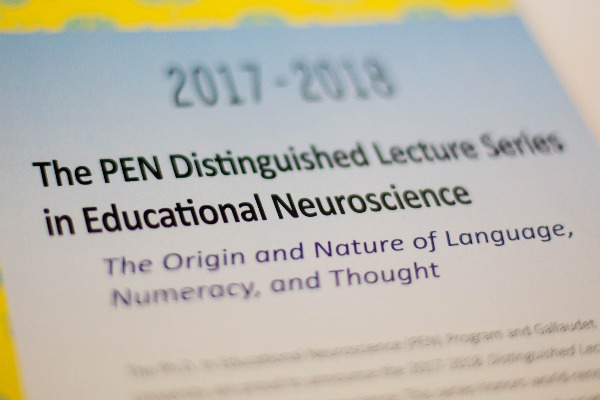PEN Distinguished Lecture Series
The PEN Distinguished Lecture Series in Educational Neuroscience was created in association with the Foundations Proseminar course for graduate students in the Ph.D. in Educational Neuroscience (PEN) program. Since its inception, the series has grown!
The lecture series focuses on the intersection of the Science of Learning (learning across the lifespan) and Educational Neuroscience (learning across early life). Scientists and researchers who are pioneers in the fields of Cognitive-Educational Neuroscience, Developmental Cognitive Neuroscience, and Child Development come to Gallaudet University's campus to talk about their research.
Register for Upcoming Lectures
All lectures are open to the public and are video recorded for online distribution.
PEN DLS brochure for 2024-2025
Contemporary Neuroscientific Contributions to the Study of Childhood Poverty
Dr. Sebastian Lipina
Dr. Lipina offered a synthesis of the contemporary evidence of neuroscientific studies of childhood poverty, in terms of (1) which associations have been identified between the experience of poverty and changes in the nervous system; (2) what mediators and moderators have been identified in such associations (particularly those related to the regulation of stress and the quality of parenting environments); and (3) what are the implications of this evidence for the design of interventions and policies.
He asserted that although the neuroscientific available evidence supports the notion about the importance of investing resources to promote different aspects of child development, its correlational and preliminary nature requires caution in: (a) sustaining notions about causal mechanisms that function as unique determinants of development; (b) reducing the explanation of complex phenomena that involve different levels of organization to only one of them (e.g., neural or social); and (c) disseminating misconceptions and over-generalizations of neurobiological phenomena.
Finally, Lipina's presentation approached some of the future directions that could expand opportunities for scientific-political transference, which include -among other possible ones - the testing of new technologies aimed at identifying processes of change and neural adaptation, as well as specific markers, in the context of interventions; and the development of computational efforts based on Relational Developmental Systems (RDS) conceptions that would contribute to policy decision-making processes.
Biography
Dr. Lipina has obtained his PhD in Psychology and is now a researcher of the National Council of Scientific and Technical Research (CONICET) in Argentina. He is Director of the Unit of Applied Neurobiology. The main focus of his research concerns the impact of poverty on development, cognition and the brain.
He is the Professor of the Seminar on Childhood Poverty and Cognitive Development at National University of San Mar n (UNSAM, Argentina). Outside of Argentina, Dr. Lipina is a Fellow of the Center for Neuroscience and Society (CNS, University of Pennsylvania) and the Codirector of the Mind, Brain and Education School (E ore Majorana Foundation and Centre for Scientific Culture, Italy).
Dr. Lipina is also part of the on-call Scientist Program for the American Association for the Advancement of Science and Associate Editor for Frontiers in Psychology. The high impact and translational applications of Dr. Lipina have brought him to be a Consultant for the Panamerican Health Organization, the UNICEF and the UNDP.
